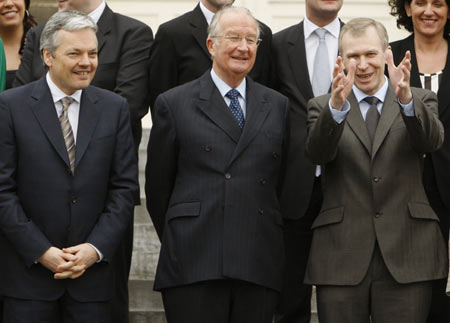
Belgium's King Albert II (C) poses with Finance Minister Didier Reynders (L) and Prime Minister Yves Leterme during a family photo with members of the new government at the Laeken Palace in Brussels March 20, 2008. (Xinhua/Reuters Photo)
Flemish Christian Democrats Jo Vandeurzen and Pieter De Crem stay on as justice minister and defense minister.
Flemish Liberals Karel De Gucht and Patrick Dewael remain foreign minister and interior minister respectively.
The leader of the francophone Christian Democrats, Joelle Milquet, is the new employment minister. Francophone Liberal Didier Reynders stays on as finance minister.
The francophone Socialists are represented in the cabinet by Laurette Onkelinx as social affairs minister and Paul Magnette as climate and energy minister.
The flemish Christian Democrats was the biggest winner in the elections in June last year, but Leterme failed twice to form a government because of the unbridgeable differences between Flemish and francophone parties over the devolution of powers to regions.
Parties from the more prosperous northern region of Flanders, where 60 percent of the country's population live, insisted on transfer of more powers from the federal to the regional government, while parties from French-speaking Wallonia vehemently opposed the idea.
In December, Verhofstadt was entrusted by King Albert II with the task of forming a new cabinet. An interim government, which involved the five major parties, was quickly set up, enabling the parties to continue their coalition talks while urgent national issues could be dealt with.
Verhofstadt, who had been head of government for the past nine years, had said he would step down in March whether a new government was ready or not.
On Tuesday, the five parties finally reached an agreement on a political program, ending the nine-month political stalemate which was unprecedented in Belgium's history.
(Xinhua News Agency March 21, 2008)